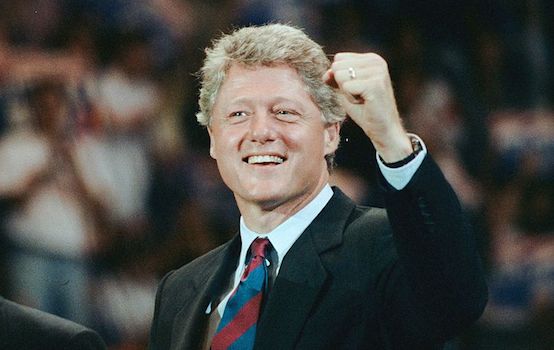Our Long History of Presidential Lies

Whether it’s President Clinton’s emphatic proclamation, “I did not have sexual relations with that woman,” or Richard Nixon’s Watergate defense, “I am not a crook,” the lesson is the same: politicians lie.
The sad reality is that voters expect no better.
Since 1976, Gallup has been polling Americans to rank various professions from least to most ethical. Nurses are nearly always perceived to be the most honest. Politicians are consistently ranked on the opposite end of the spectrum. That means most Americans think members of Congress are more unethical than car salesmen and telemarketers. It’s worth noting that politicians were ranked lowest on this list decades before Donald Trump entered the political arena.
Yet it’s President Trump, not his predecessors, who has ignited the greatest outrage over dishonesty in politics. To be sure, the sheer number of times that Trump has stretched or distorted the truth can be hard to keep up with, but a liar is still a liar whether he lies seven times a day or once a week.
What it comes down to is that Americans either want honest politicians or we do not. One thing’s for certain: we’ve done a terrible job demanding that of our presidents so far.
Just pick up any biography about any former president. Nearly every one I’ve read exposes its subject as having had a measurable propensity to exaggerate, mislead, and lie.
President Lyndon B. Johnson promulgated a myriad of falsehoods and cover-ups surrounding Vietnam and so much more. Distinguished historian Robert Dallek, in Lyndon B. Johnson, summed things up by repeating a popular joke from the time: “How do you know when Lyndon Johnson is telling the truth? When he pulls his ear lobe or scratches his chin, he’s telling the truth. When he begins to move his lips, you know he’s lying.”
And if infidelity equals a lack of integrity, then I’d argue that Johnson’s predecessor, John F. Kennedy, was one of the most dishonest presidents to have ever lived at 1600 Pennsylvania Avenue. JFK’s numerous affairs are fair game when assessing his character because, as historian Doris Kearns Goodwin put it, “Someone who refuses to deal honestly with his private life may well distort the reality he confronts in public office.”
In An Unfinished Life: John F. Kennedy, Dallek provides details of six affairs that Kennedy juggled while he was president. Among his alleged mistresses were three White House secretaries (one was his wife Jackie’s press secretary) and a 19-year-old college sophomore and White House intern. There were also reportedly numerous Hollywood stars and starlets and call girls who were paid by Dave Powers, described as “the court jester and facilitator of Kennedy’s indulgences.”
JFK’s most shameful lie, though, concerned the Bay of Pigs fiasco when he promised the American people that there would be “no military intervention in Cuba.” Just five days later on April 17, 1961, the CIA-led and Kennedy approved covert invasion of the island not only cost the lives of many, but resulted in a breakdown of trust and communication with Cuba’s Fidel Castro and Russia’s Nikita Khrushchev—conditions that led to the Cuban Missile Crisis a year later.
President Franklin D. Roosevelt also struggled to maintain integrity, both in his personal life and in politics. For one thing, he and his administration went to great lengths to hide the extent of his health problems from voters during his New York gubernatorial and presidential campaigns. Another lie came out repeatedly when he was trying to win a third term in the White House: “I have said this before, but I shall say it again and again and again: your boys are not going to be sent into any foreign wars.” He added at another campaign rally: “Your president says this country is not going to war.”
His words made for good campaign rhetoric as a peace candidate, but FDR was lying. Even as he made such assurances, he knew war with Germany and Japan was likely inevitable and he and Winston Churchill were secretly planning accordingly. It’s worth mentioning as well that, like Kennedy, FDR had an affair with his wife’s secretary, and that according to his biographer Jean Edward Smith, it was FDR’s mistress, not his wife, who was “the last face FDR saw before he died.”
Of course, we know President Obama lied when defending the NSA and earned Politifact’s “Lie of Year” with his repeated claim that “if you like your health care plan, you can keep it.” President Nixon tried to cover up his role in the Watergate scandal, President Clinton was impeached by the House of Representatives for lying under oath, and President George W. Bush out-fibbed them all when he said there was “no doubt” Iraq had weapons of mass destruction, falsely justifying America’s entry into yet another horrific war.
All this raises the question: if lying isn’t something our nation thinks is presidential material, why do we keep electing people who lie?
And yet, the fallout of the 2016 election may be the very catalyst needed to change the status quo. To be sure, in the age of Trump, every word, deed, and tweet are examined under a microscope. Journalists scrutinize every perceived deception and talk show hosts have made politics the center of their nightly programming like never before.
While this might just be “resistance” outrage and the partisan nature of the media in overdrive, I celebrate the fact that we’re finally having this conversation. Holding presidents—Republican or Democrat—to a higher standard of truth and honesty is something we seem to have lost along the way, and the integrity of the office has suffered, if not dimmed completely, as a result.
Daryl Austin is a freelance writer based in Utah. He has been published at HuffPost, the Washington Examiner, and USA Today.
Comments